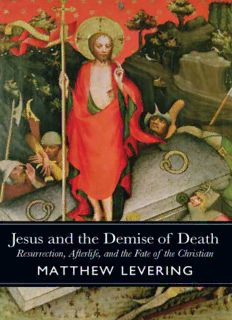
Jesus and the Demise of Death: Resurrection, Afterlife, and the Fate of the Christian PDF
Preview Jesus and the Demise of Death: Resurrection, Afterlife, and the Fate of the Christian
Jesus and the Demise of Death Given the uncertainty of which we are so certain concerning eternity, perhaps only a post-postmodern turn can save us from being overwhelmed by our impending doom, our terminal temporality. —Carlos Eire, A Very Brief History of Eternity Jesus and the Demise of Death Resurrection, Afterlife, and the Fate of the Christian Matthew Levering BAYLOR UNIVERSITY PRESS © 2012 by Baylor University Press Waco, Texas 76798-7363 All Rights Reserved. No part of this publication may be reproduced, stored in a retrieval system, or transmitted, in any form or by any means, elec- tronic, mechanical, photocopying, recording, or otherwise, without the prior permission in writing of Baylor University Press. Scripture quotations are from the New Revised Standard Version Bible Catholic Edition, copyright 1965, published by Thomas Nelson Publishers. Used by permission. All rights reserved. Cover Design by Dean Bornstein Cover Image: “The Resurrection,” c.1380 (tempera on panel) by Master of the Trebon Altarpiece (fl.1380). Narodni Galerie, Prague, Czech Repub- lic/ Giraudon/ The Bridgeman Art Library Library of Congress Cataloging-in-Publication Data Levering, Matthew, 1971- Jesus and the demise of death : resurrection, afterlife, and the fate of the Christian / Matthew Levering. 238 p. cm. Includes bibliographical references (p. 193) and index. ISBN 978-1-60258-447-1 (pbk. : alk. paper) 1. Eschatology. 2. Catholic Church--Doctrines. I. Title. BT821.3.L48 2012 236--dc23 2011032295 Printed in the United States of America on acid-free paper with a mini- mum of 30% PCW recycled content. To Ralph and Patty Levering Contents Acknowledgments ix Introduction 1 Part I The Passage of Jesus Christ 1 Christ’s Descent into Hell 15 2 The Resurrection of Jesus Christ 27 3 Sitting at the Right Hand of the Father 43 Part II The Passage of Christ’s People 4 A People in Passage: Faith, Eucharist, Almsgiving 63 5 Can We Merit Eternal Life? 85 6 Do We Have Spiritual Souls? 97 7 Bodily Resurrection and Beatific Vision 109 Conclusion 127 Notes 131 Works Cited 191 Index 221 vii Acknowledgments Like many people, I have often wondered what there is for me and my loved ones after death: what happens to us? Should even a theologian preserve a discreet silence? As Christians, however, we have much to hope for and much reason for hope. Holding “fast the word of life” (Phil 2:12), I wish to speak about this hope through Scripture and through the doctrinal and theological tradition of the Church, which benefited from Greek philosophical culture. Many wonderful people helped me with this project. As will be clear in the pages that follow, I owe a special debt to N. T. Wright, without, however, ever having conversed with him. Although at times I disagree with him, I do so from a position of broad agreement with and strong admiration for what he has contributed to biblical studies. When the Dominicans of the Aquinas Institute of Theology in St. Louis invited me to deliver their Aquinas Lecture in January 2010, I presented an early draft of chapter 1. The Dominican community in St. Louis showed me gracious hospitality, and I owe particular thanks to Dominic Holtz, O.P. Michael Drever invited me to lecture on God and Greek philosophy at the Society of Biblical Literature, and the resulting conversations benefited me in preparing this book. Timothy ix
Description: